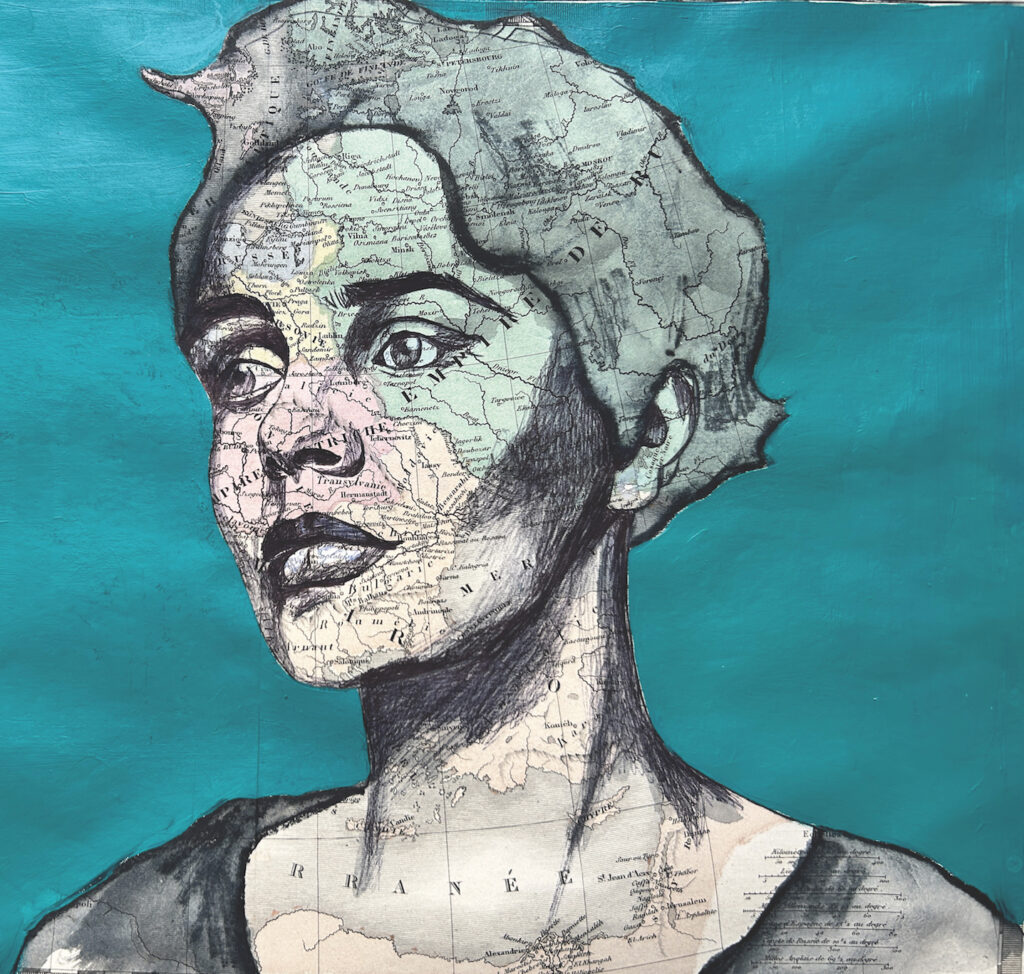
It’s in the morning that the sun comes around the massive guava tree, above the electric fence, and, as a narrow beam of light, touches Selene’s face as she lies in bed with the tips of her toes against the top bunk. Every day, she waits for this sunbeam, which, on blue-sky days, arrives punctually through a barred window measuring just thirty by thirty centimeters, into the cell shared with three other women. Over forty minutes, it shifts, millimeter by imperceptible millimeter, from Selene’s face to the wall before vanishing.
Everything happens slowly when you’re behind bars. The torture of being jailed is compounded by the torture of emptiness, the total absence of anything to do. Selene has already counted how many times her heart beats in an hour. She’s collected cigarette butts from the courtyard and halls. Using an old world map that some prior inmate left behind in the cell, she started learning by heart the names of countries and capitals. Selene doesn’t get visitors. Ever. Since her arrest, her husband, mother, siblings, none of them has come to see her. She doesn’t miss them. She doesn’t miss anyone. She feels empty most of the time. When asked about her crimes, she shrugs. At times, she can be seen crying discreetly. No one knows if she’s sorry. She doesn’t say.
She bites her tongue most of the time. She smokes most of the time. She cleans the kitchen every day after lunch, scrubbing the walls and floor hard. Always hard. Because this is how Selene does everything in life. Hard. The extra pounds concentrated in her belly and flanks leave her arms dangling on her body. Walking is hard, just as breathing takes effort when she gets bronchitis. If it weren’t for the dark purple lipstick on her lips and the big silver earrings, you’d say she didn’t care about her looks at all. She’s rough: in her soul, in how she talks, in how she walks, in how she eats.
She bore two kids. She hasn’t heard anything about them since she was arrested. They’re twelve already. Twin boys. Identical. Though not that identical for Selene. She doesn’t tell them apart by how they look, but by what they’re like. On one of her boys, she can smell death. It’s her smell, too. The family thinks that raising the boys far away from their mother means they won’t be influenced. Selene knows that one of her boys is already doomed, just like her, to be no good. Could be karma or genetics—doesn’t matter. She’s their mother. She knows what grew inside her. She knows what’s good and what’s bad inside her.
Selene doesn’t have friends in prison. She prefers being feared. Still, she has the best bed in the cell, complete with a daily strand of sun. She even gets lunch leftovers when she cleans the kitchen.
As she peruses the world map, she wonders what exists beyond the small, miserable places she’s seen. Her pointer finger travels along the delicate, meandering lines dividing countries and continents. Locked up, Selene carries the whole world in her hands, tracing an imaginary line that crosses borders and takes her everywhere. The cell door unlocks. It’s time to go out for some sun, look at the sky, and wait for the day to end. ![]()
Ana Paula Maia (Brazil, 1977) is an author and scriptwriter and has published several novels, including O habitante das falhas subterrâneas (2003), De gados e homens (2013), and the trilogy A saga dos brudos, comprising Entre rinhas de cachorros e porcos abatidos (2009), O trabalho sujo dos outros (2009) and Carvão animal (2011). Her novel A guerra dos bastardos (2007) won praise in Germany as among the best foreign detective fiction. She won the São Paulo de Literatura Prize for best novel of the year in 2018 for her novel Assim na terra como embaixo da terra and in 2019 for Enterre seus mortos.
Padma Viswanathan is a writer, playwright, translator, and journalist. Her most recent book is Like Every Form of Love: A Memoir of Friendship and True Crime. She is the author of two previous novels: The Toss of a Lemon, shortlisted for the Pen Center USA Fiction Prize, and The Ever After of Ashwin Rao, a finalist for Canada’s Scotiabank Giller Prize. Her translation of the novel São Bernardo (2020), by the Brazilian writer Graciliano Ramos, was shortlisted for the Oxford-Weidenfeld Translation Prize and runner-up for the UK Society of Authors TA First Translation Prize.
